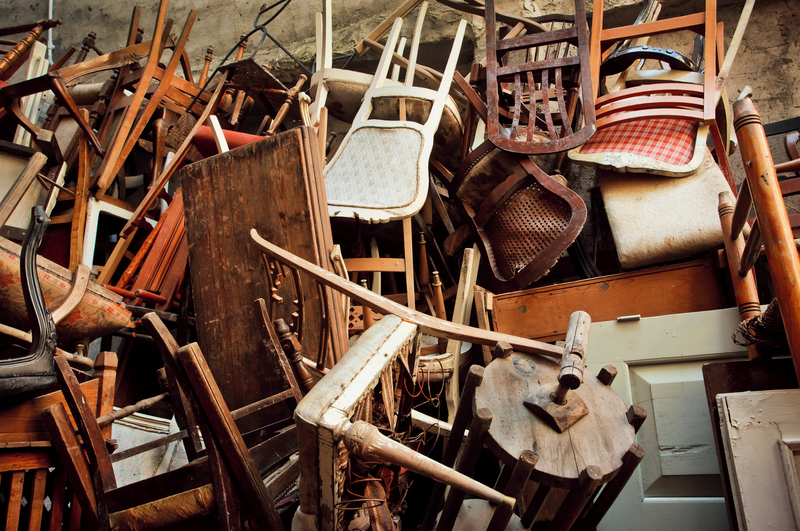Organized and Relaxed: Avoiding Stress During a Move
Moving into a new home or apartment is often one of life's most exciting milestones. However, it is also known to be one of the most stressful experiences a person can go through. With endless to-do lists, last-minute mishaps, and the pressure to get everything done in time, it's easy to feel overwhelmed. But your move doesn't have to be a chaotic transition. In this comprehensive guide, we'll share proven strategies to keep you organized and relaxed throughout the moving process, ensuring you remain stress-free and can fully enjoy your new beginning.

Why Moving Is So Stressful
First, let's understand why moving is such a stressful event. When you move, you're not just transporting your belongings from one location to another. You're uprooting your daily routines, leaving behind familiar environments, and often navigating significant life changes. It's a period marked by uncertainty and time-sensitive decisions. That's why staying organized and calm during a move is crucial for your mental and emotional well-being.
Planning Ahead: The Key to a Calm, Organized Move
The most effective way to avoid stress during a move is by planning ahead. Preparation is everything. By starting early, setting clear milestones, and following a detailed moving plan, you can greatly decrease last-minute chaos and minimize moving day surprises.
Create a Moving Timeline
An actionable timeline ensures you remain organized and relaxed while moving. Your timeline should outline every major task from two months before the move up to moving day.
- Two Months Before: Research moving companies, start decluttering, and collect packing materials.
- Six Weeks Before: Finalize your moving method (DIY truck or movers), donate or sell unwanted items, and notify schools or employers of address changes.
- One Month Before: Begin packing non-essentials and secure important documents. Confirm moving dates and arrangements with service providers.
- Two Weeks Before: Finish most packing, arrange for pet or childcare, and prepare a moving day essentials kit.
- One Week Before: Defrost freezer, confirm key pick-up for your new place, and clean your current home.
- Moving Day: Do a final sweep of all rooms, check utility shut-off, and double-check your checklist before leaving!
Using a timeline will help keep you on track and collected, preventing last-minute panic.
Declutter for a Lighter, Easier Move
A major moving mistake is taking everything with you, including items you no longer need. Start your moving process by decluttering. Sort through each room and divide items into categories:
- Keep - Essential items you use and love.
- Donate/Sell - Items in good condition but no longer useful to you.
- Recycle/Trash - Broken or worn-out items.
Decluttering not only lightens your load but also reduces moving costs, saves time packing and unpacking, and makes your new space feel fresh and organized from the start.
Smart Packing Strategies: Stay Organized Throughout
The way you pack can make the difference between a stressful, disorganized move and a smooth, efficient one. Stay relaxed by packing in a logical, methodical manner.
Label Everything Clearly
Label every box with its contents and destination room. Consider using color-coded labels or stickers for each room to streamline the unloading process. For example, use blue for the bedroom, green for the kitchen, and red for the living room.
- Name of the Room (e.g., Kitchen, Master Bedroom)
- Summary of Contents (e.g., Plates & Glasses, Bedding)
- Special Instructions (e.g., FRAGILE, THIS SIDE UP)
Taking the time to label thoroughly means you won't waste energy hunting for items or opening every box at your new home, helping you remain stress-free during your move.
Pack a Moving Day Essentials Box
The first night in a new place can be disorienting. Pack a box or suitcase with essentials so you're not searching for toothbrushes, chargers, or pajamas after a long day. Include:
- Basic toiletries (soap, towels, shampoo)
- A change of clothes and sleepwear
- Medications and first-aid kit
- Chargers for devices
- Snacks, water, and coffee supplies
- Basic kitchen supplies (a pot, spoon, paper plates, mugs)
Keeping essentials handy ensures you remain calm and comfortable as you settle in.
Protect Your Valuables
Pack important documents, jewelry, and sentimental items in a separate bag that you keep with you during the move. Items like passports, birth certificates, contracts, and treasured family heirlooms should never be left to the moving truck. Keeping them close creates peace of mind and maintains your sense of organization during a move.
Choosing the Right Help: DIY vs. Professional Movers
An orderly, low-stress move often comes down to choosing the right help. Should you hire a professional moving company, or do it yourself with friends or family?
Benefits of Hiring Professional Movers
Professional movers can take a huge burden off your shoulders, particularly for long-distance moves or if you have a lot of large, heavy items. Key advantages:
- Experience & Efficiency - Pros know how to pack and transport quickly and safely.
- Insurance - Most companies offer coverage for loss or damage.
- Less Lifting - Save your back and avoid injury by letting movers handle heavy furniture.
Choose reputable, licensed movers. Read reviews and get referrals to prevent potential scams or poor service. Don't forget to verify liability and insurance coverage for your items in transit.
When to Consider a DIY Move
For smaller moves or if you're on a budget, a DIY move may make sense. Recruit friends or family, rent a moving truck, and plan for plenty of breaks and snacks. Remember though:
- DIY moves can be physically demanding.
- Poor packing or loading could lead to damaged items.
- Consider the cost (truck, fuel, equipment, and helpers) to ensure it truly saves money versus hiring professionals.
Administrative To-Do's: Keep Your Paperwork in Order
Moving isn't just about boxes and furniture; it's also about notifying organizations and companies about your change of address, setting up utilities, and updating personal records. Staying organized with paperwork is crucial to prevent surprise bills or missed mail after you move.
Must-Do Administrative Tasks Before You Move
- Change your address with the post office, banks, and credit card companies.
- Transfer utilities (gas, electric, water, internet, cable).
- Update auto and renter's insurance to reflect your new address.
- Notify your employer, schools, and healthcare providers.
- Cancel or switch local memberships and subscriptions.
Keep all move-related documents together in a dedicated folder or digital location, including mover contracts, receipts, rental agreements, and proof of address change. This ensures you always know where everything is, minimizing stress.
Mental Health: Tips for Staying Relaxed During a Move
It's natural to feel anxious or emotional when moving. Between the physical demands and emotional goodbyes, stress can sneak up on anyone. Here are strategies to safeguard your mental well-being during your move:
- Take regular breaks - Don't try to do everything in one day; schedule downtime and mini-rewards.
- Practice deep breathing and mindfulness - Five minutes of slow breathing can restore calm instantly.
- Stay hydrated and eat well - Don't skip meals or forget your water bottle. Good nutrition keeps your energy balanced.
- Focus on the positives - Visualize your new space, new routine, and the opportunities your move brings.
- Ask for help - It's okay to rely on friends, family, or professional help when needed.
Remember, a significant part of remaining calm and organized during a move is recognizing when to slow down and give yourself time to adjust.
Tips for Unpacking: Setting Up Your New Home With Ease
Arrival at your new home marks the final leg of your journey. Unpacking can be just as overwhelming as packing if not approached methodically. Use these tips to maintain organization and relaxation during your move-in phase:
- Start with essentials - Unpack your moving day box, set up beds, and connect key appliances first.
- Tackle one room at a time - This maintains focus and offers a psychological boost as you complete each space.
- Keep clutter at bay - Break down boxes as you go and take out trash and recycling regularly.
- Personalize slowly - Hang art, arrange decor, and make your space feel like home over several days, not all at once.
Unpacking steadily, rather than all at once, helps maintain a feeling of control and relaxation as you transition into your new environment.

Moving With Kids or Pets: Organization Tips for Families
Moving with children or pets adds another layer of complexity to any move. With extra planning, you can keep them comfortable and stress-free:
For Kids
- Involve them in packing and let them decorate their moving boxes.
- Keep favorite toys, snacks, and comfort items accessible.
- Explain the process and include them in farewells and new home exploration.
- Try to keep routines as consistent as possible before, during, and after the move.
For Pets
- Keep pets in a quiet, familiar room during packing and on moving day.
- Transport your pet in your own vehicle, with their bed, toys, and food.
- Set up a "pet zone" in your new home immediately to give them comfort.
- Update address and contact information with your vet and pet registries.
Preparation and planning ensure everyone in your family feels secure and cared for, further reducing stress during moving.
Conclusion: Embrace a Calm, Organized Move
Relocating doesn't have to be an ordeal. With thoughtful planning, smart packing, and a mindful approach to self-care, you can keep your move organized and relaxed from start to finish. Embrace the opportunity for a fresh start, take things step by step, and don't be afraid to ask for help. By avoiding moving stress and focusing on organization, you'll not only ensure the process goes smoothly--you'll also start your time in your new home with the positive energy it deserves. Happy moving!



